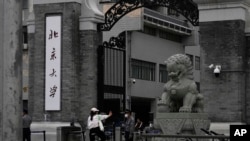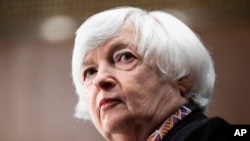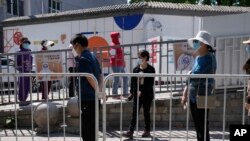China’s zero-COVID policy, which has led to long lockdowns in major cities and suspended operations in factories, businesses and schools, is taking a bigger bite out of the country’s overall economic growth.
Economic numbers from the country continue to paint a grim picture from the government’s policy aimed at eliminating all coronavirus cases. From new car sales to high tech equipment to major exports, the continuing lockdowns are hitting many sectors of China’s economy.
Shanghai posted zero car sales last month as almost all dealers were closed during the city’s sudden lockdowns, according to a statement from Shanghai Automobile Sales Trade Association released on its social media account May 16.
Overall, China’s auto sales plunged 31.6% in April from a year ago, according to official figures.
The loss does not appear just to be in the monthly sales. Tu Le, founder of Beijing-based advisory firm Sino Auto Insights, told VOA that China's auto manufacturing industry is facing a bigger supply chain crisis due to labor and component shortages across the country.
“There are two major problems right now: Production has stopped at many local factories, and customers can’t buy cars. If people can't buy cars, the market momentum will be hit hard. The whole (auto) supply chain is in crisis,” Tu said.
Shanghai plays an essential role in China’s auto industry. The city ranks No. 1 in overall car production, with nearly 3 million new vehicles produced in 2021. This accounts for 10.9% of domestic auto production, according to statistics from the country’s automobile manufacturers association.
Shanghai authorities have announced that they will allow more businesses to resume normal operations from the beginning of June after nearly two months in lockdown, but Tu remains worried about unpredictable lockdowns affecting the future of China's auto industry.
“The uncertainty is going to remain until COVID is completely or almost completely eliminated from China," Tu said.
The story is similar with high tech products.
Several major Taiwanese computer manufacturers with factories in Shanghai, including Quanta Computer, Compal Electronics, Wistron, Inventec and Pegatron, reported double-digit declines in April’s revenue year-on-year due to factory line suspension during the lockdowns.
At Quanta Computer’s first quarter earnings conference call on May 13, Vice Chairman and President C.C. Leung said that the company’s production in April was down 40% from a year ago due to supply chain issues in Shanghai, Yahoo finance reported. Leung expected production to decline in the second quarter by 20% year over year.
Chien-Chun Huang, chief of Mainland China Affairs Division at the Chinese National Federation of Industries in Taipei, told VOA that the impact of China's zero-COVID policy on the electronics industry is likely to grow in the next two quarters.
“The biggest problem is the mobility of people, that is, the limitation on the movement of personnel in different cities is still quite strict. Even if there is a way to resume work, workers can’t go to the factory, so the goods can’t be produced,” Huang said.
Wu Jialong, a Taipei economist, told VOA that as long as China sticks to the zero-COVID policy, the companies have no other choice but to operate under limited capacity.
“Companies have problems transporting raw materials. Even if you have some inventory, they still struggle to ship finished goods to consumers,” Wu said.
China's pandemic policy also hurts firms in other countries. Japanese carmaker Toyota announced Tuesday that the company will introduce rolling production pauses across 10 Japan-based factories due to parts shortages caused by the lockdown in Shanghai.
U.S. Treasury Secretary Janet Yellen said last week that China’s COVID lockdowns appear to be impeding the flow of goods and hampering the global supply chain. She warned the slowdown in the Chinese economy could affect other countries.
As a result of the stringent lockdowns and supply chain gridlock, more foreign businesses are reconsidering their investments in China.
A survey released earlier this month by the European Union Chamber of Commerce in China showed that 23% of respondents are now considering shifting current or planned investments out of China to other markets due to China’s COVID policy. This number has more than doubled since the beginning of 2022 and is the highest proportion in the past decade.
Tech giant Apple has proposed boosting production in India and Vietnam in order to reduce its dependence on China, according to a Wall Street Journal report on May 21. Currently, more than 90% of Apple products are manufactured in China by outside contractors.
With competitive labor costs, Vietnam and other Southeast Asian countries are benefiting from a shift in global supply chains. Vietnam reported 19% growth in exports last year and is becoming a key exporter of electronics and computer components.
Nick Marro, global trade lead at The Economist Intelligence Unit, said multinational companies are likely to focus on expansion in Southeast Asia as China will not abandon its zero-COVID policy anytime soon.
“We don't expect China to abandon its zero-COVID stance until after the Party Congress in the autumn, with gradual movement away from these protocols unlikely until 2023,” Marro told VOA in an email. “That means that the risk of future and sudden shutdowns, production suspensions, mass testing and other disruptions will persist for quite some time.”







